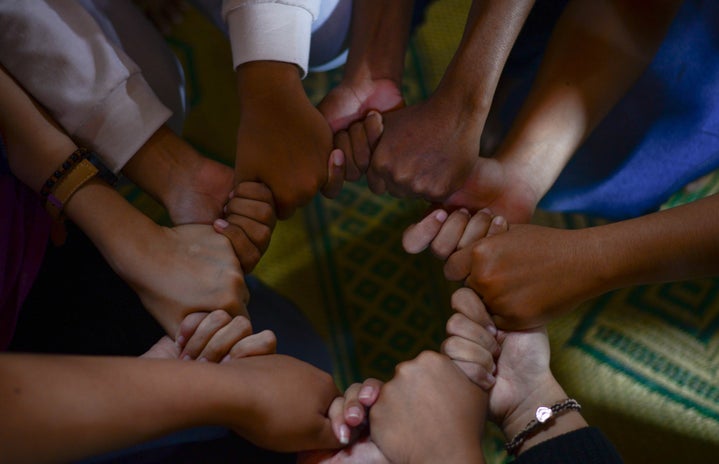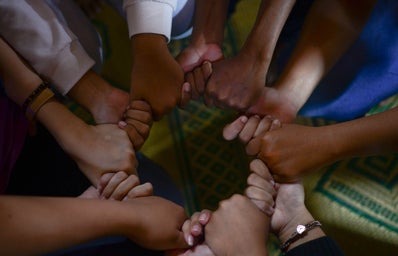The Sex Lives of College Girls is an American teen comedy-drama television series created by Mindy Kaling and Justin Noble that premiered on HBO Max in 2021. I had heard mixed opinions on the show, and I fully intended to hate-watch it because I thought it would be SO corny, but I genuinely ended up loving it because of how much I loved every single character. I’m strictly a character-oriented person, whether it’s books, shows, movies, or any sort of media. If I love the characters and enjoy their interactions with each other, even a corny plotline won’t come my way from watching and endorsing a show.
Let me recap a RH4-6th-Floor favourite show for you.
Season 1:
Pilot→
After bidding farewell to their slightly (or, in Kimberly’s case, excessively) emotional parents, first-year flatmates Kimberly, Bela, Leighton, and Whitney dive headfirst into the complexities of college life, quickly realising that it isn’t exactly (remotely) what they had envisioned.
What I loved about the show was how perfectly the four girls fit together. On paper, they’re not the kind to be in the same friend group, poles apart in every way. Firstly, we have Leighton, the picture-perfect preppy sorority girl with the “ideal” parents, an “aspirational” life, big dreams, and old money. Next, we have Bela, a classic case of a summer glow-up girl with dreams of breaking into the comedy industry– a traditionally male-dominated field. Whitney excels on the soccer field, and interestingly, she is the child of a U.S. Senator. Kimberly, hailing from a quiet Arizona town, adds her unique charm to the mix.
Episode 2: Lessons in Essex→
As we pace through the second episode, we watch Kimberly find Essex out of her league academically. When you live in a small town and are the most intelligent girl at school, the sheer volume of people at a huge Ivy League tends to make you feel less bright. However, she soon finds herself smitten with Leighton’s brother, Nico and convinces him to tutor her in French. Their connection deepens, leading to a passionate physical relationship. Nico attempts to help her academically by offering her access to an upcoming Economics exam through his fraternity’s files. Despite reservations, Kimberly uses the exam but is swiftly caught. While her expulsion is avoided, she loses her scholarship, leaving her in a challenging situation. Faced with this daunting challenge, Kimberly searches for a solution and makes a tough choice to finance her education: she opts to sell her eggs, a decision not without its complexities. Kimberly’s academic struggles mirror the daily, accurate and often overwhelming challenges that college students face. The fear of academic failure, financial insecurity, and the pressure to succeed are universal experiences that add to the massive relatability factor of the show.
Episode 3: Behind Closed Doors→
On the flip side, while Leighton appears to be thriving academically, her romantic life tells a different story. One of the show’s most raw and poignant moments unfolds as she grapples with her sexuality, a struggle portrayed with remarkable authenticity. Deeply closeted, she resists her brother’s encouragement to date his friend, concealing her true self from everyone around her. Amid her community service at the women’s centre, Leighton crosses paths with Alicia, sparking a secret romance hidden from the world. However, their relationship shatters when Leighton’s inability to come out puts Alicia, who is already openly gay and proud, in a difficult position. While realising that Leighton is far from ready to come out, Alicia knows that keeping their relationship secretive would put her in a bad place. Their breakup doesn’t vilify either of them; it showcases their vastly different yet valid perspectives. Leighton’s journey with her sexuality feels incredibly genuine and refreshing to witness. What sets her apart from many other closeted queer characters in television is the space she’s given to breathe and come to terms with her identity. This nuanced portrayal stands out in its authenticity and depth, striking a chord with many.
Episode 4: Breaking The Silence→
Bela has passionate dreams about being a hotshot comedy writer and had initially chosen Essex because of their popular comedy magazine, ‘The Catallun’. However, her excitement soon turns to disappointment when she discovers the magazine operates within an overwhelmingly male-dominated environment. Faced with this stark reality, Bela resorts to performing regrettable acts, seeking attention from the club’s male members by performing sexual favours(a decision she regrets, in hindsight). While acknowledging that this was far from her proudest moment, it’s crucial to recognise the context: Bela, a woman of colour striving to break into a field with an abysmal male-to-female ratio, felt compelled to take drastic measures. In some unfortunate way, she becomes a victim of the pervasive patriarchal system, highlighting the challenges women face in such environments. However, when she does become a part of the club, one of the male co-editors makes her watch a sexual video without her consent. She does begrudgingly report him to the co-editor of the club, who does not end up believing her at the beginning. Still, her story encourages another member with a similar experience to come out with her story. Bela’s struggle to report the incident and the initial lack of support and belief mirrors the challenges women often face when reporting harassment. Many women fear not being taken seriously, facing retaliation, or damaging their reputation, which can deter them from coming forward about their experiences. Bela’s storyline sheds light on the importance of representation and supportive networks. When women see characters like Bela facing similar challenges and persevering, it can empower them to speak out, seek help, and challenge the status quo.
Episode 5: Power Dynamics Unmasked→
Entering another plotline, we are introduced to Whitney’s covert relationship with her assistant coach, a narrative delicately handled by the show’s writers. When the head soccer coach discovers the affair, the response defies the typical victim-blaming trope prevalent in such situations. Rather than pointing fingers at Whitney, the head coach takes a commendable stance, opting to report the assistant coach while ensuring Whitney’s anonymity. This pivotal moment not only exposes the power dynamics at play but also underscores the importance of addressing such issues responsibly and empathetically.
As someone who, much like many others, has grown up observing relationships with authority figures and intricate power dynamics often glamorised in media (coughs *Pretty Little Liars*coughs *Aria and Ezra*), the show’s astute portrayal of the power dynamics in Whitney’s relationship was remarkably refreshing. It shattered the conventional narrative, offering a realistic and thought-provoking perspective on the complexities of authority-involved romances.
Finale→
Enveloped in genuine humour and heartfelt companionship, “The Sex Lives of College Girls” emerges as a groundbreaking coming-of-age series that captures the raw challenges faced during the tumultuous years of college. Unlike many shows, it doesn’t attempt to sugarcoat the struggles or hasten the characters’ maturity to make their experiences more digestible. Instead, it embraces an authentic approach, depicting the complexities of transitioning from adolescence to adulthood. The series doesn’t shy away from the awkward, confusing, and oftentimes messy aspects of college life, be it cheating on exams; being unable to come to terms with your sexuality, or finding yourself in a sticky position with an authority figure – making it remarkably relatable and authentic to the diverse range of emotions and experiences that real-life college students(girlies) often encounter. This commitment to authenticity allows viewers to deeply connect with the characters, recognising their struggles and triumphs in the genuine, unfiltered narratives presented in the show.


